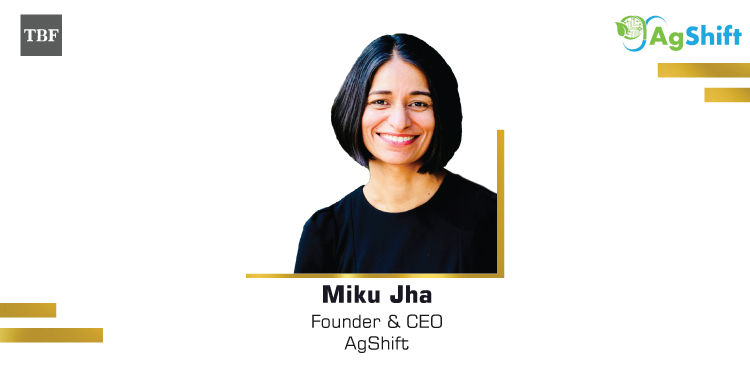A bacon, the torch-barer, a leader are some of the roles too easy to follow, but to become one is something that needs skills. Some of the most basic skills required are to identify the problem, ideating a solution over it and lastly executing it.
Automation in the food supply industry was a concept that was slowly taking place in India. Yet, it still had time to find its roots. Having come from a farm holder community, Miku Jha was well aware of the difficulties of food ecosystem. And what added an advantage to it was the fact that she knew it from the grower’s perspective.
Knowing the problems first hand, she decided to do something about it. Technology was her niche and she had built many successful start-ups and had also led the execution of many large-scale enterprises.
With known problems and technology at hand, she decided to revolutionize the food supply chain and founded AgShift.
“I was convinced that even a slight improvement in automation and insights could deliver massive benefits to the food supply chain. With this conviction, I founded AgShift.”
The Company-
AgShift is an AI based food technology company working on designing the world’s most advanced autonomous food inspection system.
The company is still in the early stages of the food industry, adopting disruptive technologies like AI. Since AI is a statistical tool built with continuous self-learning and improvements, nothing in AI is ever 100%. Their goal is to have the baseline AI solution be on par or better than a senior inspector for a given commodity.
“We do not just sell the solution; we work in a strategic collaboration with our customers and get them to the ROI they are looking for.”
It is not so much about solution A versus solution B; it is more about crossing that adoption curve where they want to start investing in automation and digitization for better operational efficiencies.
Once the AI solution achieves similar levels of accuracy to senior inspectors, we are ready to commercially deploy. Every Hydra from a customer’s perspective is like one of their most senior and seasoned inspectors but 15 times faster!
So, with each Hydra, the customers can significantly inspect a much larger sample size in less than half of the time, fully digitized with audit trails for better, faster and more objective inspections at scale with higher throughput—that’s where the ROI comes from. It is not just from the AI component but from a fully integrated turnkey solution which streamlines the entire quality inspection process.
Adopting a disruptive technology that impacts an element as critical as quality is not an easy decision for food organizations. As a company philosophy, AgShift works with their customers at every step of the life cycle to ease this transition and deliver on measurable ROI.
To a Future Filled with Hopes-
Having worked in the service industry, and knowing the little challenges it has, Miku Jha feels that every woman has the ability to form and to lead. And every woman should.
Gender biased roles today are no more the strategy to work a company. What speaks more is the experience and the ability. With her initiative and the ability to run an organization, and by presenting the world with innovative technology, Miku’s goal is to inspire as many women entrepreneurs as possible to find their own path and their own success.
Hundreds of startups go public every year, but only 20 have ever been founded and led by women. It is time that this number is more than just 20.
“And my goal is providing all the help, advice and mentorship to young women entrepreneurs to improve this number.”
It is not just about a number. More women-led startups will diversify leadership and expand the business culture where compassion and empathy are not viewed as signs of weakness but can coexist with strength and other attributes of leadership.
Miku’s Message to the Young Woman Entrepreneurs Out There-
Raising venture capital for women entrepreneurs is hard,but doing soin food tech is even harder. It is important to establish as many proof points as possible early on. If the key metrics which the investors look for are met or can be convincingly met, then the process becomes easier since the risk appetite of VCs for women-led businesses is lower. Thus, more proof points have to be delivered.
The key strategies that worked for us:
Establishing strategic relationships with customers early on: The biggest ambassadors and champions for young startups are the potential customers who can speak to why they would use a product. The customer relationships have to be nurtured, and products should exceed their expectations. If their needs are met, then investment will occur. One customer can get you multiple investments, but it is not essentially the other way around.
Exploring alternative options of fundraising: Early on, delivering on the venture capital metrics and requirements are difficult. You should explore alternatives such as investing in individuals who believe in the vision of the company, choosing accelerators who can invest and connect you to key customers, receiving government grants which give you no dilutive capital, getting paid for commercial trials with customers. All these options are viable and should be considered.










